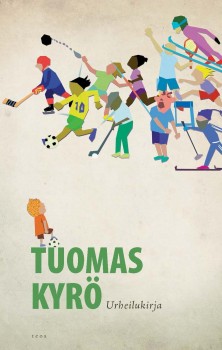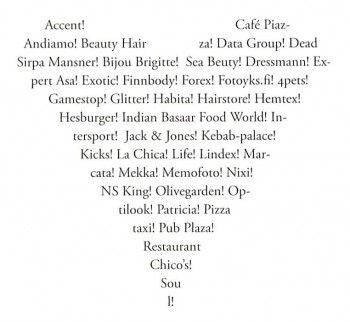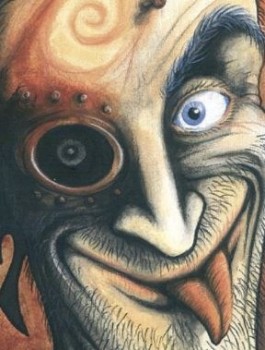Fiction
A soul on the train
In one of Heli Laaksonen’s poems the narrator buys a ticket for her soul and herself in a train’s pet carriage. Her capricious poetry features new potatoes, woodpeckers, weasels, and even a pig in fox’s clothing. Introduction by Mervi Kantokorpi
Poems from Peippo vei (‘The chaffinch took it’, Otava, 2011)
First early
From the potato patch there rose a human seedling, too.
Winston, I called it
as it was Winstons I’d sowed in this row
Whole,
beautiful,
unmarked by hoe or blight.
I put it in the basket with the others.
It sat there in the quiet pile, at the edge,
looked on while I slogged away,
gnawing a little bit out of the side of a potato.
What was it thinking?
What could it be that earlies think about?
The first summer sparrows are fresh out of the oven.
I so wish they’d only think about nice things.
I try to look happy
to give them a good start. More…
Scent of greenness
21 April 2011 | Fiction, poetry
‘Time the unstoppable’ features in the last collection of poems, Gramina, by Bo Carpelan (1926–2011), who reads timeless poetry while writing his own verses. In his introduction, Michel Ekman quotes the American poet and philosopher Ralph Waldo Emerson, who thought books should stimulate the reader’s thoughts instead of merely being devoured
Poems from the collection Gramina. Marginalia till Horatius, Vergilius och Dante (‘Gramina. Marginalia to Horace, Virgil and Dante’, Schildts, 2011)
Surf on the net –
in the net you are
with mouse and waiting spider
![]()
Fills life’s piggy bank
until it is emptied
![]()
The paved road of envy
where you stumble
![]()
Be sufficient unto oneself?
And who is this ‘self’
who doesn’t introduce himself? More…
Suddenly here, fully present
5 April 2011 | Fiction, poetry
The women in mirrors who recur in the work of Aila Meriluoto (born 1924) are poetic figures who have featured in her poetry since her first collection, published in 1946. In these new poems, from Tämä täyteys, tämä paino (‘This fullness, this weight’), she also describes women who are ‘alive to the brim’ or ‘extreme ballerinas’. Introduction by Mervi Kantokorpi
We live in strange times
my skull full of echoes.
The rose has throbbed
the heart flowered.
In the mirror a girl on her head,
from the wall steps an old woman,
all of them familiar,
none remembered.
Suddenly here.
Fully present.
Eighty-five years.
Hands wrinkled, shaky legs.
And alive to the brim.
And over. Dripping.
Surging. More…
We are the champions
25 March 2011 | Prose
 Heroes are still in demand, in sports at least. In his new book author Tuomas Kyrö examines the glorious past and the slightly less glorious present of Finnish sports – as well as the meaning of sports in the contemporary world where it is ‘indispensable for the preservation of nation states’. And he poses a knotty question: what is the difference, in the end, between sports and arts? Are they merely two forms of entertainment?
Heroes are still in demand, in sports at least. In his new book author Tuomas Kyrö examines the glorious past and the slightly less glorious present of Finnish sports – as well as the meaning of sports in the contemporary world where it is ‘indispensable for the preservation of nation states’. And he poses a knotty question: what is the difference, in the end, between sports and arts? Are they merely two forms of entertainment?
Extracts from Urheilukirja (‘The book about sports’, WSOY, 2011; see also Mielensäpahoittaja [‘Taking offence’])
The whole idea of Finland has been sold to us based on Hannes Kolehmainen ‘running Finland onto the world map’. [c. 1912–1922; four Olympic gold medals]. Our existence has been defined by how we are known abroad. Sport, [the Nobel Prize -winning author] F. E. Sillanpää, forestry, [Ms Universe] Armi Kuusela, [another runner] Lasse Viren, Nokia, [rock bands] HIM and Lordi, Martti Ahtisaari.
The purpose of sport at the grass-roots level has been to tend to the health of the nation and at a higher level to take our boys out into the world to beat all the other countries’ boys. We may not know how to talk, but our running endurance is all the better for it. However, the most important message was directed inwards, at our self image: we are the best even though we’re poor; we can endure more than the rest. Finnish success during the interwar period projected an image of a healthy, tenacious and competitive nation; political division meant division into good and bad, the right-minded and traitors to the fatherland. More…
Do you remember the yellow house?
14 February 2011 | Fiction, Prose
Extracts from the novel Enkelten kirja (‘The book of angels’, Tammi, 2010)
[Tallinn, summer] The past will not go away
and the present is insurmountable. Summer vacation has begun, the newspaper hasn’t come; it doesn’t get delivered here anyway. Can you remember the Isabelline yellow house? Remember the alley with the name that means hurry? Surely you remember the home with all the maps on the shelves, the important papers and the brass objects bought from nearby antique dealers? Also the rugs from North Africa and the obligatory cedar camel figurines on the windowsill. And so many glasses and plates and empty lighters in a cardboard box on the shelf on the left hand side of the kitchen.
Tallinn, June 7th. The floors creak. One step has split in half; some of the lights have burned out. This is a lovely home. A small window upstairs is ajar to the courtyard. Tuomas had latched it behind the Virginia creepers. The fountain in the courtyard is dry. On cold nights the smoke from the fireplace grows like a statue for the crows until it wraps around over the layered rooftops like a snake eating its tail. Russian men are repairing the attic of the house across the street for wealthy people to live in; they laugh in front of the window and smoke. Tuomas waves at them, and they wave back. The courtyard is creepy when it’s empty. Soon the neighbours would go about their day and quietly close their doors behind them, and two nearby churches would divide the hours into quarters, Russians and their gossip would make their way to the Alexander Nevski Cathedral, and the Estonians and their gossip would go to their own churches where a wise and peculiar, almost human scent would rise from between the headstones. Tuomas wouldn’t smell it, Aino would and would move to stand beneath the the center tower. More…
A spot of transmigration
13 January 2011 | Fiction, Prose
A short story, ‘Sielunvaellusta’, from the collection Rasvamaksa (‘Fatty liver’, WSOY, 1973)
‘Where will you be spending Eternity?’ a roadside poster demanded as Leevi Sytky sped by in his car.
‘Hadn’t really thought about it,’ Leevi muttered , as if in reply, and lit a cigarette.
But at the next level crossing, a kilometre or so further on, he was run down by a train, whose approach he had failed to notice. His attention had been distracted by the sight of a young woman who was picking black currants by the side of the track, and who happened to be bending forward in his direction. Intent on obtaining a better view of her ample bosom by peering over the top of her blouse, Leevi neglected to look both ways, and death ensued. Damned annoying, to say the least.
In due course he secured an interview with God, who turned out to be a biggish chap, about a hundred metres tall, wearing thigh-boots and sitting behind a large desk.
‘Well, and how’s Leevi Sytky getting along?’ God asked, lighting his pipe.
‘Mustn’t grumble,’ said Leevi politely.
‘And how are you thinking of spending Eternity?’ God inquired, sucking at his pipe and puffing out his cheeks. More…
‘Joy and peace prevail…’
25 December 2010 | Fiction, Prose
Dear readers,
to celebrate the change of the year we publish an extract from Aleksis Kivi’s 1870 classic novel, Seitsemän veljestä (Seven Brothers), translated by David Barrett, and a bit of a classic of our own too: it’s a nostalgic glimpse of a Finnish Christmas spent in a humble cottage inhabited, in addition to the eponymous seven brothers, a horse, cat, cockerel and two dogs (at least). Enjoy!
Soila Lehtonen & Hildi Hawkins & Leena Lahti
On a festive night
It is Christmas Eve. The weather has been mild, grey clouds fill the sky, hills and valleys are covered with the snow that has only recently begun to fall. The forest gives out a gentle murmur, the grouse goes to roost in the catkined birch, a flock of waxwings descends on the reddening rowan, while the magpie, daughter of the pine-wood, carries twigs for her future nest. More…
The guest event
12 November 2010 | Fiction, Prose
A short story from Vattnen (‘Waters’, Söderströms, 2010)
It was a lagoon. The water was not like out at sea, not a turquoise dream with white vacation trimming on the crests of the waves. This water was completely still and strange, brown yet clear, sepia and umber, perhaps cinnamon, possibly cigar with the finest flakes of finest wrapper. Clean. This water of meetings was clear and clean in a non-platonic, remarkably earthbound way.
Sediment and humus, humus floating about in the morning sun.
It felt comforting, as if the water didn’t repel the foreign bodies as a matter of course, didn’t immediately suppress the other particles and sanctimoniously hasten to force anything that wasn’t water, anything that could be interpreted as pollution and encroachment, down to the bottom and let it dissolve and die all by itself. This water sang its earth-brown song of unity without thereby becoming any less water than water-water was.
Helena felt cold. More…
Last flamenco in Seville
5 November 2010 | Fiction, poetry
The tragic story of a gypsy woman, famously transformed into an opera by Georges Bizet, inspired Saila Susiluoto to write about freedom in the contemporary world: her new collection of poems, entitled Carmen, is set in the shopping centre of an asphalt city. But is this classic femme fatale really a human being – or a cyborg, perhaps? Introduction by Teppo Kulmala
She was made of plastic strips, metal bits, artificial skin, implants, circuit boards. Her heart pumped blood like a real one, her eyes watered as necessary. She was made free and loving, and almost soulful. But the soul is a quirk, said the Creator, a human mistake causing pain and death. And confusion. And the degradation of this world. They left out what they couldn’t say, what they were unable to say. They said: your name is Carmen, go forth, find your balance on threads across the world, you are a meek machine, built to love everything except just one man. You are glowing wires, bright shiny strips of plastic, a mind made of images and tones, your step is light, go, go.
The mall’s scintillating youth choir
(gesticulating in the manner of a musical)
I am me
30 September 2010 | Fiction, Prose
Extracts from the novel Poikakirja (‘The boy’s own book’, Otava, 2010). Introduction by Mervi Kantokorpi
It’s a small day in spring. Another name for the lark is the skylark. You can only see them sometimes, and even then they’re so high up in the sky that they swoop like fast-moving dots.
The kitchen windowpane is rippling with stripes. The window has a bottom, and at the bottom there is some cotton wool and two opened matchboxes, a blue Sampo and a picture of an army chaplain in his uniform and insignia. As spring has progressed the cotton wool at the bottom has turned into wet blobs and the matches will never light again, as they’ve sucked up the winter frost from the glass.
Most children are made at home but not us, says Eini during walking practice. Outi shoves her, tells her to be quiet and walk in rhythm. I’m behind the table reading the Children’s Encyclopaedia, but I watch them. With every second step, their bottoms swing to the right and then to the left.
Mum comes into th the kitchen and asks what they’re doing; Anna-Liisa responds on the twins’ behalf, says they’re practising walking like in the movies and that’s why they’re wiggling their hips. More…
Child of chaos
10 September 2010 | Comics, Fiction
A cornucopia of exciting plots and strange characters, the mythic epic Kalevala has inspired innumerable artists since its first publication in the 1830s. A recent interpretation of the story of an extremely tragic hero named Kullervo takes the form of a graphic novel by Gene Kurkijärvi: his urban Kullervo lives in a grim environment – not unlike Helsinki, but carrying with dystopian overtones – where the heroes and/or villains are steely androids and hairy weirdos who shoot drugs and use foul language. This 21st-century Kullervo is a surrealist cyberpunk tragedy – laced with pitch-black comedy.
Extracts from the graphic novel Kullervo by Gene Kurkijärvi (Like, 2009; captions translated by Owen Witesman) More…
Memory in my hands
19 August 2010 | Fiction, poetry
A couple of years ago Timo Harju chose the non-military alternative to national service and was detailed to work at an old people’s home. Its director warned him that its inhabitants were ‘no sweet old grannies and grandpas’. Harju thought this might be a joke. In his first collection of poems, entitled Kastelimme heitä runsaasti kahvilla (‘We watered them abundantly with coffee’, Ntamo, 2009), he patiently gathers fragments of dreams and fears, memories and forgotten songs in the house of oblivion, treating them with gentle empathy. Commentary by Pia Ingström
Ward A5, Thursday
The clouds in the nursing home corridors, sky-open springlike after a bathe
and forgotten, in a frayed blue dressing-gown beside an osiery.
The grannies in the nursing home corridors, the last beautiful pride
you keep in a small wooden box behind your forehead:
if the lid opens by accident all the things may drop to the floor
topsy-turvy you won’t be able to find them, your back won’t let you
you won’t recognise them any more even if you do,
the springtime tears your insides to pieces.
Here they come, the grannies.
Better to stay here indoors, the journey to the dining room is a rough one
exposed like this
a long way and all by sleigh.
You stare at the keyhole: the clouds are coming. More…
A happy day
12 August 2010 | Fiction, Prose
‘Muttisen onni eli laulu Lyygialle’ (‘Muttinen’s happiness, or a song for Lygia’‚) a short story from Kuolleet omenapuut (‘Dead apple trees’, Otava, 1918)
‘Quite the country gentleman, eh, what, hey?’ says Aapeli Muttinen the bookseller. ‘Like the poet Horace – if I may humbly make the comparison, eh, dash it? With his villa at Tusculum, or whatever the place was called, given to him by Maecenas, in the Sabine hills, wasn’t it? – dashed if I remember. Anyway, he served Maecenas, and I serve – the public, don’t I? Selling them books at fifty pence a copy.’
Muttinen’s Tusculum is his little plot of land in the country. A delightful place, comforting to contemplate when the first signs of summer are beginning to appear, after a winter spent in town in the busy pursuit of Mammon, under skies so grey that the wrinkles on Muttinen’s forehead must have doubled in number. A summer paradise of idleness… More…
My friend Erik Hansen
Short prose from Muita hyviä ominaisuuksia (‘Other good characteristics’, Otava, 2010)
On the first day we played getting-to-know-you games. On the second day we played real Finnish baseball out behind the university. On the third day we travelled to the countryside. Classes started sometime at the end of the second week. We watched the movie One Flew Over the Cuckoo’s Nest. The professor slurped Coke, chain smoked, and rewound the video back and forth: Nurse Ratched’s plump face filled the screen and then in the next image where her face had been there was a basketball Jack Nicholson was squeezing.
It was the autumn of 1992, and I was studying film and communications theory in Copenhagen.
The excursion to the country frightened me, a shy bacteriophobic neurotic. The Danes thought the camping centre’s shared mattresses and group cooking were hygge – cozy. There is no way a dictionary translation could ever cover all the forms of cosiness the Danes achieve together. I fled the camping centre on the first morning. On the train to Copenhagen I recognised all the usual post-escape feelings: shame, fear, guilt, loneliness and overwhelming euphoria. More…
Misery me
Extracts from the collection of short prose, Mielensäpahoittaja (‘Taking offense’, WSOY, 2010)
Past pushing up daisies
Well, yeah, so I took offense when the doctor said that considering my age I’m in tip-top shape. His theory was that my 25-kilometre ski circuits would keep an old coot like me in shape, if they didn’t kill me first. He said if I were to start just sitting on the couch and waiting, then the Reaper would be on my back in no time.
I don’t ski for my health. I ski because it’s pretty in the forest, and when a body is sweating he doesn’t think a whole lot. More…


